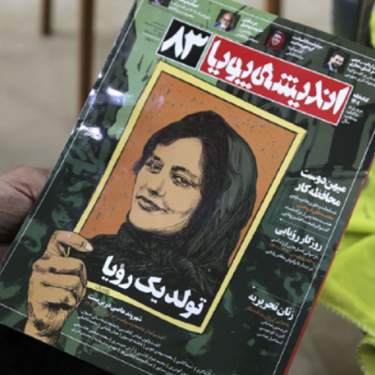Iranian reporters not giving up after six months of protests and persecution

More than 70 journalists have been arrested in Iran since the start of the protests following Kurdish student Mahsa Amini’s death in police custody on 16 September. The interviews Reporters Without Borders (RSF) has conducted with reporters reflect responses ranging from fear to combativeness.
Regarded as one of the world’s most repressive regimes, the Islamic Republic of Iran has stepped up its harassment of journalists in the past six months in an attempt to silence them. Of the 70 journalists arrested since Mahsa Amini’s death on 16 September, 16 are still being held, bringing to 27 the total number of journalists currently jailed in Iran. Most journalists are now terrorised, exhausted, and even desperate. But thanks to unflagging resistance from some, news and information are still circulating, both within the country and abroad.
“Despite the heavily repressive arsenal deployed by the authorities, despite imprisonment, violence and censorship, Iran’s journalists continue to cover the situation in their country. Six months after Mahsa Amini’s death, it is time for the Iranian government to understand that its policy of terror is in vain.
On condition of anonymity, several Iranian journalists agreed to talk to RSF about what it is like to live and work under heightened surveillance. All voiced anxiety and acknowledged that they sometimes have to censor themselves to avoid possible interrogation or arrest.
“Any type of communication with friends abroad can make our case worse,” said a journalist who was arrested by the security forces on 18 January. “It's an endless nightmare,” another Tehran-based journalist said. “I'm afraid to write anything, even in my notebook. I feel I’m being watched all the time.”
Iranian journalists feel threatened even when they are abroad. A reporter based in France recently learned that he was in the Islamic Republic’s crosshairs when he was tipped off by the French foreign intelligence agency, the DGSE.
“It's tiresome to have to look behind you when you walk down the street and to watch every passing car to make sure you're not being followed,” he told RSF. This journalist previously received online death threats. The French authorities have advised him and his partner not to travel to countries neighbouring Iran. The Persian-language TV channel Iran International was forced to close its headquarters in London on 13 February because of threats against its journalists.
Each word is a battle
A popular Persian adage quotes a bush as saying: “No matter how often you attack me and cut me, I won’t suffer, I will bloom again.” A poem by the author Iraj Janatie Ataie is often quoted by Iranian journalists, who – despite the pressure – dare to cover subjects that annoy the authorities. In February, the reformist daily Sazandegi did not hesitate to report on the surge in meat prices although it resulted in a temporary suspension.
Ali Pourtabatabei knew he could get into trouble by posting information about a mysterious wave of poisonings of Iranian schoolgirls on his Qom News site. He did it anyway and, as a result, he was arrested on 5 March and is still being held. Elahe Mohammadi, a reporter for the daily Ham Mihan, and Nilufar Hamedi, a reporter for the daily Shargh are also still jailed. They were the first two women journalists to cover Mahsa Amini’s death and funeral in September. Held since the end of September, they are still paying the price.
One journalist told RSF she took a firm decision to resign after being arrested in October only to change her mind. “I can't find a job more satisfying than this,” she said. “If I retire from journalism, I’ll lose my identity.”
However, she and other journalists who resist have to wrestle over every word they use. “We are constantly thinking about how to play on words in order to convey the true meaning of what we want to say while still being able to defend it before the authorities,” another journalist told RSF. “In Iran, today, courage begins the moment you decide to write an idea for an interview or a story in a notebook.”
